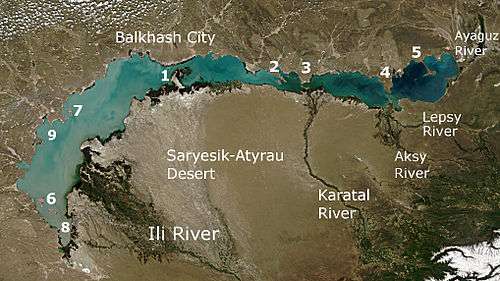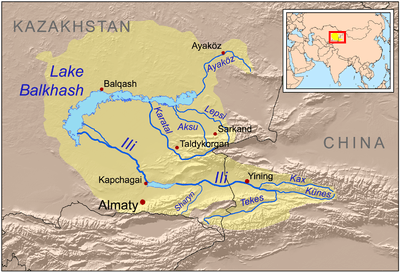Ajaguz River
| Ajaguz Ayaköz | |
|---|---|
|
Map of the Lake Balkhash drainage basin | |
| Country | Kazakhstan |
| Basin features | |
| Main source | Tarbagatai Mountains |
| River mouth | Lake Balkhash |
| Basin size | 15,700 square kilometres (6,100 sq mi) |
| Physical characteristics | |
| Length | 492 kilometres (306 mi) |
The Ajaguz (Kazakh: Аягөз; Ayagöz) also spelled Ayaguz and Ayaköz,[1] is a river in Kazakhstan.
Geography
The Ajaguz River is fed by snowmelt from the Tarbagatai Mountains and is used for irrigation, flowing into the eastern end of Lake Balkash, although there is no longer much flow from the river into the lake. The city of Ajaguz is located on its banks. The river is 492 kilometres (306 mi) long and has a basin area of 15,700 square kilometres (6,100 sq mi).
 |
The numbers mark the largest peninsulas, island and bays: |
History
In 1717, Kaip Khan and Abul Khayr attacked the Dzungar Khanate but were defeated on the River Ayaguz. [2]
Various Russian explorations took place in the area in the first half of the 19th century. Federoff explored the area in 1834.[3] Between 1837 and 1843 the trans-Irtysh steppe as far as the Ayaguz River and Chu River was mapped on a scale of five versts to the inch. The shores of Lake Balkash were also surveyed and explored. Prince Gortchakoff, governor of Western Siberia, sent an officer named Assanoff in 1839 with some men to Lake Balkash to see if a fishing station could be established.[3] He left Ayaguz and descended the Ayaguz River taking soundings, and fishing. He found two types of fish: marena and sudak, although not in large numbers, in the brackish water.[3] The Kuzu Kerbetch tomb was found nearby and was said to be significant to the Kyrgyz population.[3][4] Kuzu-Kerpetch was a Krygyz chief known from folk songs for valor and his love for Baian Sulu (who eventually caused his death)[3]
Fauna
The river's reedy lower section was once tiger habitat.[5] The river turned up an Ordovician trilobite fossil, an Agerina acutilimbata (see list of trilobite genera), found by Ghobadi Pour et al. in 2011 in Katian, Karagech Formation on the east side of the Ajaguz River 7 kilometres (4 mi) north of Akchii village in the Tarbagatai Range.[6]
References
- ↑ Ayaköz - Mapcarta
- ↑ History of Civilizations of Central Asia: Development in contrast : from the sixteenth to the mid-nineteenth century,Ahmad Hasan Dani, Vadim Mikhaĭlovich Masson, Unesco UNESCO, Jan 1, 2003 page 97 (cited toKazaksko-russkie otnosheniya v XVI-XVIII vv 1961 pp 22-24)
- 1 2 3 4 5 From Kulja, Across the Tian Shan to Lobnor by N. Prejevalsky
- ↑ A Journey Through Semiretchia to Kuldja in 1880 Proceedings of the Royal Geographical Society and Monthly Record of Geography, Edward Stanford, 1881 Volume 3 page 155
- ↑ Mammals of the Soviet Union, Volume 2 Part 2 Carnivora edited by V. G. Heptner page 119, 181
- ↑ Ordovician of the World edited by Juan Carlos Gutiérrez-Marco, Isabel Rábano, Diego García-Bellido pages 174, 175
External links
Coordinates: 46°40′N 79°15′E / 46.667°N 79.250°E
